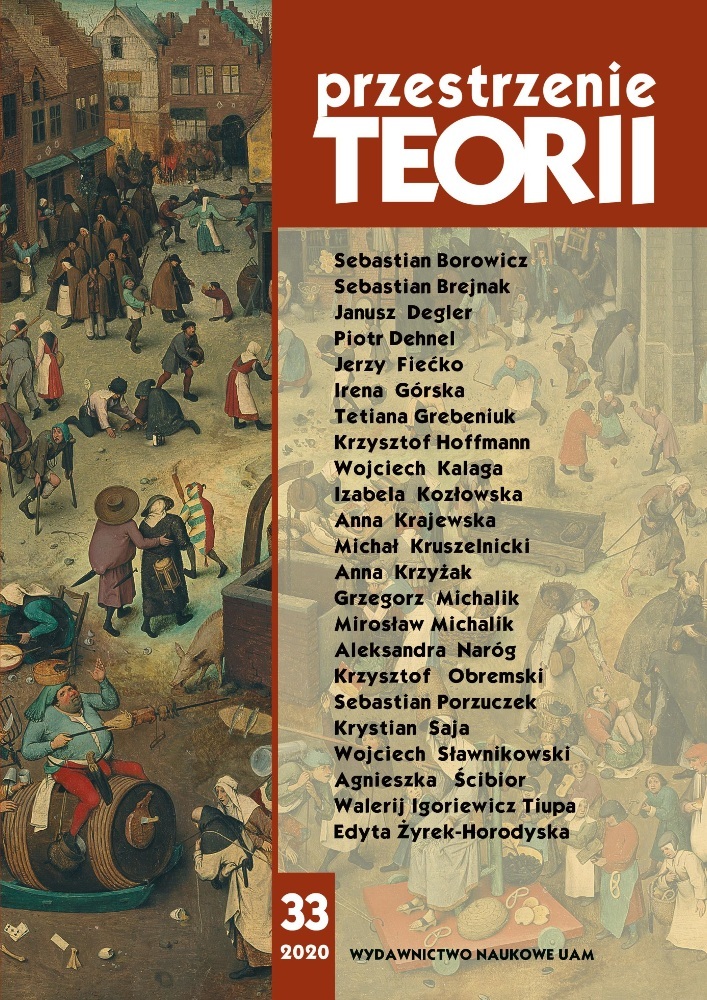Abstract
The topic of the article is the role of child characters in Andrei Tarkovsky’s oeuvre. The first part concerns the early films in which children appear as main characters and represent a spiritual ideal. In the second part, later films are analysed in terms of the presence of adult characters striving for this ideal.
References
Alexander-Garrett L., Andrei Tarkovsky: The Collector of Dreams, tłum. M. Amadei Ashot, London 2013.
Birzache A.G., The Holy Fool in European Cinema, Abingdon 2016.
Encyklopedia PWN, hasło: Nikołaj Burlajew, <https://encyklopedia.pwn.pl/haslo/Burlajew-Nikolaj-P;3882140.html> [dostęp: 12.09.2019].
Green P., Andrei Tarkovsky: The Winding Quest, London 1993.
Johnson V.T., Graham P., The Films of Andrei Tarkovsky. A Visual Fugue, Bloomington
Kaczmarski J., Rublow, <https://www.kaczmarski.art.pl/tworczosc/wiersze/rublow/> [dostęp: 15.09.2019].
Kuśmierczyk S., Księga filmów Andrieja Tarkowskiego, Warszawa 2012.
Le Fanu M., The Cinema of Andrei Tarkovsky, BFI, London 1987.
Martin S., Andrei Tarkovsky, Harpenden 2011.
Pierwszy List do Koryntian. Rozdział 4, <https://biblia.deon.pl/rozdzial.php?id=289>[dostęp: 13.09.2019].
Robinson J.M., The Sacred Cinema of Andrei Tarkovsky, Maidstone 2006.
Rutkowski R., Stańcie się jak dzieci! O twórczości filmowej Andrieja Tarkowskiego, „Znak” 2007, nr 621, <http://www.miesiecznik.znak.com.pl/6212007rafal-rutkowskistancie-sie-jak-dzieci-o-tworczosci-filmowej-andrieja-tarkowskiego/> [dostęp: 11.09.2019].
Sartre J.-P., Discussion on the Criticism of „Ivan’s Childhood”, <http://nostalghia.com/TheTopics/Sartre.html>, tłum. M.G. Singh [dostęp: 8.09.2019].
Sartre J.-P., Lettera su „L’Infanzia d’Ivan”, „L’Unità”, 9 X 1962, <https://archivio.unita.news/assets/main/1962/10/09/page_006.pdf> [dostęp: 8.09.2019].
Słownik języka polskiego PWN, hasło: jurodiwyj, <https://sjp.pwn.pl/slowniki/jurodiwyj.html> [dostęp: 13.09.2019].
Strefa filmu. Kino Andrieja Tarkowskiego, red. I.A. NDiaye, M. Sokołowski, Toruń 2013.
Tarkovsky. Films, Stills, Polaroids and Writings, ed. A.A. Tarkovsky, H.J. Schlegel, L. Schirmer, London 2019.
Tarkowski A., Czas utrwalony, przekład, przypisy i posłowie S. Kuśmierczyk, Warszawa 2007.
Tarkowski A., Kompleks Tołstoja. Myśli o życiu, sztuce i filmie, wybrał, opracował i przedmową opatrzył S. Kuśmierczyk, Warszawa 1989.
Turovskaya M., Tarkovsky. Cinema as Poetry, tłum. N. Ward, oprac. i wstęp napisał I. Christie, London 1989.
Zwierciadło. Andriej Tarkowski w rozmowie z Jerzym Illgiem i Leonardem Neugerem, oprac. J. Illg, L. Neuger, Kraków 2016.
License
Authors
Authors of texts accepted for publication in Przestrzenie Teorii are required to complete, sign and return to the editor's office the Agreement for granting a royalty-free license to works with a commitment to grant a CC sub-license.
Under the agreement, the authors of texts published in Przestrzenie Teorii grant the Adam Mickiewicz University in Poznań a non-exclusive, royalty-free license and authorize the use of Attribution-NonCommercial-NoDerivatives 4.0 International (CC BY-NC-ND 4.0) Creative Commons sub-license.
The authors retain the right to continue the free disposal of the work.
Users
Interested Internet users are entitled to use works published in Przestrzenie Teorii since 2015, for non-commercial purposes only, under the following conditions:
- attribution - obligation to provide, together with the distributed work, information about the authorship, title, source (link to the original work, DOI) and the license itself.
- no derivatives - the work must be preserved in its original form, without the author's consent it is not possible to distribute the modified work, such as translations, publications, etc.
Copyrights are reserved for all texts published before 2015.
Miscellaneous
Adam Mickiewicz University in Poznań retains the right to magazines as a whole (layout, graphic form, title, cover design, logo etc.).
